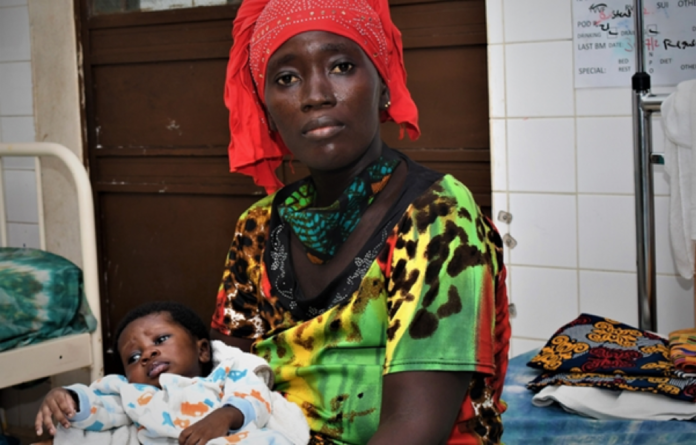By: Christian Alpha Conteh
“I was depressed and ashamed to interact with friends and relatives because of fistula. My husband who was my source of support told me at one point that he almost abandoned me. I was not a happy woman as a result of this [fistula] predicament,” Maseray Bangura
“My dignity has been restored. I have spent a week without experiencing urine leaks.” Maseray Bangura
Approximately 2 million women currently live with fistula globally. In 2003, in line with universal targets to advance maternal and newborn health to make fistula as rare as possible, UNFPA, the United Nations sexual and reproductive health agency, and its partners launched a global campaign to end fistula. Sierra Leone, estimated to have 2,400 women living with obstetric fistula, is among the 55 nations participating in the global campaign.
Pregnant with her fifth child, 38-year-old Maseray Bangura a petty trader from Mambolo in the Kambia district was taken to the Government Hospital in Lungi, a referral hospital in Port Loko district for her delivery. There, she encountered difficulties and was unable to deliver the baby.
“For three agonising days, I was experiencing severe labour pain. I was unable to deliver my baby. The nurses told me I didn’t have enough blood. It was a difficult moment for me. To save my life and that of the baby, a caesarean delivery was performed successfully and a few days later, I was discharged,” she said.
Narrating her ordeal, Maseray said when she was discharged a week later, she realised she had developed serious complications, having returned home with fistula. “Four days after returning home, I realised I was leaking urine unconsciously. This was too much for me. It was a shameful thing to experience. I chose not to tell anyone and only confined it to my husband and my mother,” she recounted sadly.
Obstetric fistula is preventable and, in most cases, can be repaired surgically. In Sierra Leone, with funding from the Government of Iceland, UNFPA partners with non-governmental organisations like Haikal Foundation and Aberdeen Women’s Centre to conduct screening for women with suspected obstetric fistula, and surgery to repair their fistula and restore their dignity. UNFPA also supports the government in preventing the incidence of obstetric fistula by strengthening the quality of obstetric services, a key component to addressing maternal mortality.
In 2020, for instance, 260 women were screened for suspected obstetric fistula. Of these women, 129 had surgery to repair their fistula, with 31 of them receiving livelihood skills as part of their rehabilitation and reintegration. Since 2011 to date, Aberdeen Women’s Centre, with funding support from UNFPA, has successfully performed 1,731 fistula surgeries.
Obstetric fistula is a childbirth injury that leads to the development of a hole between the birth canal and the urinary tract resulting in constant leakage of urine or faeces. This is often the direct result of failure by a health system to provide quality health care during childbirth.
Women who develop fistula often have prolonged labour due to the failure to make a timely decision to go to the health facility when labour starts, or a delay in reaching a health facility due to a poor referral system or bad road network, or the failure of a health facility to provide timely and apt treatment to women during childbirth.
“It’s quite challenging getting patients to come for screening because of the stigma surrounding fistula,” said Alie Kamara, fistula programme officer at the Aberdeen Women’s Centre. “Many of them are not confident to leave their homes to get screened.”
Aminata Jalloh is an obstetric fistula supervisor at Aberdeen Women’s Centre in Freetown. She said the effects of fistula are much more than the physical pain.
“The condition often leaves women feeling rejected by their husbands, stigmatized by their families, and alienated by their communities.”
The discrimination often drives women from their homes and puts their livelihoods in jeopardy. She appealed to government and donor partners to make fistula funding a priority
With 717 deaths per 100,000 live births, according to the 2019 Demographic and Health Survey, Sierra Leone is still among the countries with the world’s highest maternal mortality ratio. Bleeding in pregnancy (obstetric haemorrhage) accounts for about 40% of maternal deaths in the country.
Safe pregnancies and childbirth depend on functioning health systems and the provision of quality care.
Civil Society Organisations have also played a role in raising awareness about fistula, one such CSO is Health Alert-Sierra Leone. Victor Lansana Koroma is the intuitions Executive Director. He said over the years they have called for increased budget allocation to the Ministry of Health, this increase in resources will go a long way to address issues like fistula which has received very little attention due to budget constraints.
He appealed to donors like the UNFPA to continue providing valuable services for the women of Sierra Leone.
“Health Alert will continue to help in the awareness-raising and advocacy to see reduced cases of fistula. And where fistula occurs facilities are available to provide treatment to correct the defect,” said Victor Lansana Koroma.
In Sierra, Leone UNFPA is addressing fistula prevention (as well as prevention of maternal and newborn mortality and morbidity, and stillbirth, and improving the quality of maternal care) by supporting the Ministry of Health and Sanitation in improving quality services for pregnant and postnatal women.
When Maseray learned of the work of Aberdeen Women’s Centre, she travelled to Freetown with her husband to be admitted at the centre for her fistula surgery.
“I successfully underwent the surgery without paying a cent. I have seen so much improvement and I am beginning to gain my happiness and self-confidence. My dignity has been restored. I have spent a week without experiencing urine leaks. My wish now is to return to my hometown because I am not leaking anymore,” Maseray said happily.




